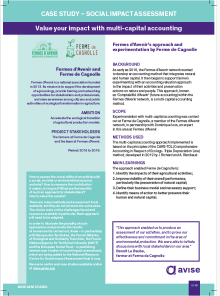Valuing social and environmental impact with multi-capital accounting: the Cagnolle Farm experiment
An innovative accounting approach to assess and value social and environmental impact
Created in 2013, the national association Fermes d'Avenir's mission is to support the development of agroecology, train and facilitate networking for actors and professionals, and raise awareness among citizens and public authorities of the ecological transformation of agriculture.
As early as 2016, the Fermes d'Avenir network wanted to develop accounting that integrates natural and human capital. Wishing to demonstrate their contribution to the ecological transition, the farmers of Ferme de Cagnolle decided to experiment with a multi-capital accounting method based on the CARE-TDL method developed by J. Richard and A. Rambaud.
An illustration of the approach adopted by Ferme de Cagnolle provides insight into the methodological principles of this accounting method, and presents the accounting documents that integrate natural and human capital. This case study analyzes the initial findings of a multi-capital accounting experiment that enabled the Cagnolle farmers to identify the impacts of their farming activities, gain a better view of their farm's overall performance, and identify the leverage needed to promote action in order to further preserve human and natural capital.
